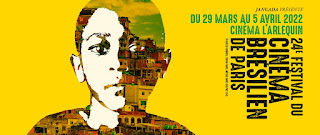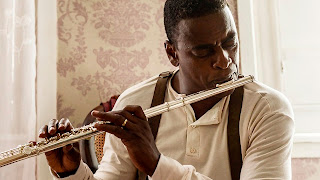Like many arts events, the Brazilian Film Festival of Paris found itself scrambling to survive when the Covid-19 pandemic hit in 2020. Organizers first moved the programming online because of lockdowns, and then changed the date to summer in 2021. Now, the festival is back with live screenings of films that will take place in the French capital March 29 to April 5.
“When I was
working in television in the late Eighties and there was something about
Brazil, it was always negative, focusing on street children, drugs or poverty,”
she told SWAN in 2013 - a year that Brazil was the “guest of honour” throughout
France, with a range of cultural events.
While the
festival has faced difficulties since then, Adler says it has become an
important event in Europe, and she and her co-organizers are determined to see
it continue. The following edited interview with Adler took place in Paris via
telephone in March 2022.
SWAN: The
pandemic affected the festival in 2020. How did you cope?
SWAN: What’s
happening at this year’s event?
KA: We have a line-up
of 29 films, and we’re really happy to be back with screenings in the cinema
because that’s important for viewers. We have 10 to 12 special guests coming from
Brazil - I think that’s significant too. And the festival can be seen as a
fighter because we’re still resisting negative trends even though we don’t have
a sponsor this year.
SWAN: Among the
notable films that will be screened, there is a documentary on renowned musician
Gilberto Gil, titled Gilberto Gil - Antologia Vol.1 and directed by Lula
Buarque de Hollanda. Can you tell you tell us more this?
KA: Yes, the
closing film of the festival is about Gilberto Gil, and it includes archival
footage that’s unknown to most people. The images come from his personal archive,
and it’s a very interesting film about him, about his life and music.
SWAN: Along
with this year’s theme of music, you’re also focusing on a work that had a
great impact on Brazilian filmmaking.
KA: We’ve
chosen a film by Nelson Pereira dos Santos, Rio 40 Graus, which somehow changed
the way that directors subsequently made movies because it was filmed in a
favela in Brazil, with Black actors, and that was significant. After this film,
Brazilian cinema changed a bit, but we’re still far from having representative Black
directors in Brazil. There’s still much to be done to portray and represent Black
Brazilians, who make up 50 percent of the population.
SWAN: Overall, what’s
the main importance of a festival such as yours, especially with the sizable Brazilian
community in France?
KA: In addition to the Brazilian community, about 70 percent of our audience consists of French
film fans who are interested in Brazilian culture, and the festival serves on
one hand to promote Brazilian cinema, but it also serves to highlight French
distributors of Brazilian films. France is the leading country for co-production
of films with Brazil. But Brazilian cinema is on average still not widely known.
It’s not like Brazilian music, which most people know, and which is played just
about everywhere. I think it’s fundamental to have a festival that has existed
for 24 years and which is a platform for Europe, because other countries ask
for the films after seeing them at the festival.
Photos (top to bottom): the poster for the Brazilian Film Festival of Paris; Katia Adler; and a shot from the film Pixinguinha. Images are provided courtesy of the festival.
The festival is
also making about 8 films - features and documentaries - available online from
March 29 to April 30, 2022.
For more information: Festival du cinéma brésilien de Paris 24 - Festival - Jangada



